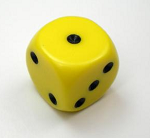|
Yeah we got a real headscratcher on our hands here gang. Why did he choose suicide when death by torture was on the table?
|
|
|
|

|
| # ? May 22, 2024 07:28 |
|
Terratina posted:Any pointers for intrigue? Ultimately, intrigue is driven by uncertainty. Everybody wants something (often the same thing), but for reasons, nobody can just cop to it. And nobody has the power to get what they want alone, so they always need support from someone else to achieve their goals. But if someone else makes a better offer, the person you thought was supporting you is probably going to stab you in the back, probably at an incredibly inopportune time. Right, so how do we gamify this? The first step is to define a whole bunch of top-tier NPCs. For each of those NPCs, you'll want to broadly define both a) their ultimate goals (both short-term and long-term), b) what resources each one can bring to bear (either for themselves or in support of others), and c) their relationships to each other (both public and private). This will form the framework for the intrigues between them. For instance, you might define the following: Under normal circumstances, Jarden Holth, Emperor of the Sunlit Realms is in charge of everything that transpires in his imperial court. He is the final arbiter of what is and is not law, and can bestow or strip ranks and titles at his whim. He's also an increasingly senile, doddering old fool. Korax Gesult is the Grand Vizier of the Empire, meaning he's nominally the guy who holds the purse-strings. Through "creative accounting," he has the money to make almost anything happen. All he wants to do is keep his job when the next Emperor is crowned. Fidyel Tolen is the Lord High Chamberlain, and is the man who controls access to the Emperor. By limiting who can appear in the Imperial Court, he has huge sway on being able to shape imperial policy. He is tremendously unpopular, however, and must take care to maintain the appearance of impartiality, tradition, precedent, etc. So he might be able to delay someone important getting an audience with the Emperor, but he probably can't prevent it outright. Diridien Holth is the Crown Prince, nominally next in line for the Celestial Throne. He is an arrogant, spoiled wastrel, but he is known to handsomely reward those who are loyal to him. He is not the only claimant to the throne, but according to tradition and precedent, he has the best claim. Elzadreth Ming is the Lord High Admiral, commander of the Sunlit Realm's powerful navy. While the Emperor is nominally the commander-in-chief of all of the Realm's armed forces, when push comes to shove, sailors will follow their captains and captains will follow their admiral (unless they think that one day they can supplant him). As such, anyone looking to take the throne without Ming's support is probably going to have to fight for it. Ming is a curmudgeonly traditionalist, disliked by most but respected by all. Firith Cob is commander of the Praetorian Guard, the troops that protect the Emperor and the Imperial Court. It is said that whoever holds the Celestial Court holds sway over the Sunlit Realms; like the Lord High Admiral, anyone looking to take the throne without Cob's support is looking for a fight. Given that Praetorians are always in the Emperor's presence, Firith Cob can theoretically provide an end-run around the Chamberlain (whom he detests). The Cob clan has ably served the Holth imperial family in this capacity for six generations. He seeks to avoid war at all costs. Graegen Uld, the Duke of Nablus is the most powerful noble in the Empire, with vast land holdings and significant mercantile wealth. He is at once both garrulous and pious, and seeks to cultivate personal relationships with others. He probably possesses the best information network in the Empire. Though he would never admit it, he would love to see clan Uld supplant clan Holth as the imperial family, through marriage if possible, by force if necessary. He loathes the current Crown Prince. Zuhaanu Gi is ambassador to the Celestial Court from the nearby realm of Xenobia. He is odd, and his mannerisms occasionally rankle traditionalists. He often proclaims ignorance of Celestial values and social mores, but his "slips" and "offences" are always calculated, with an eye towards provoking in order to observe reactions. While he offers little in the way of military support, Xenobia is wealthy. It is in Zahaanu Gi's best interests for the Celestial Court to be in strife and chaos, as that increases Xenobian influence. So this gives you your top-level people. Now define a rank of people maybe one rung down from them. Like a prickly noble-warrior in the Praetorian Guard who wants to supplant Firith Cob. Or a couple other dukes who are weaker than Uld, but somehow related to the imperial family. Already you will start to see intrigues forming - people whose positions or personalities might allow synergies, people whose positions allow synergies but whose personalities don't mesh, or people who get along great but don't have much to offer each other. Once you've figured out the main players, you need to make sure that the events of the game keep the intrigues dynamic. By this I mean that every event in the game world (whether the PCs are involved or not) will cause things to change - supporters will change sides, people will betray each other, new alliances will form, etc. Also, one of the most important things to keep in mind is that intrigues are built on secrets, and that knowledge is power. Everyone will be working off incomplete or incorrect information, so keep track of who knows what (right or wrong), and have them act accordingly. It can be a lot of work (at least initially), but if done correctly, intrigue games are a blast because players will quickly feel like they're swept up in events that are bigger than themselves. Their actions - even small ones - can have ripple effects that are felt far beyond their immediate time or place, which will allow them to look back and say, "Hah, we did that!" or "Oh, poo poo, that was our fault!" or "If only we had known then what we know now!" Ilor fucked around with this message at 22:34 on Nov 22, 2017 |
|
|
|
Sanford posted:"You back Glasstaff into the corner, crying and begging, babbling and bleeding. Tears and snot mix with the blood caked into his beard as he pleads with you, but the fear of his unknown master still seems to eclipse his fear of you and he will not surrender. He scrabbles desperately at the shelf next to him, slipping a silver thimble onto his finger and pointing it at you. His arm trembles so much that even at this range it is unlikely he will hit you. Then suddenly his resolve seems to strengthen, and his arm steadies. He raises his finger to his temple, looks you straight in the eyes, and whispers "bang". His brains hit the wall at the same time as his body hits the floor." If your players didn't like that, get new players.
|
|
|
|
AlphaDog posted:If your players didn't like that, get new players. I think they liked it! They were very disappointed at having to wait till next time to loot his study. That will teach them for upsetting my plans - I spent nearly two hours setting up a thieves/goblins/guards throwdown in the town square and they just went “right, we skirt round the edge of the town and go straight to the wizard’s manor”. Players!
|
|
|
|
AlphaDog posted:If your players didn't like that, get new players. e: once they had a hostage lead them to the enemy camp and it was all about whether they'd scared him enough to not raise the alarm, and I said "as soon as the first sentry comes into view, your prisoner draws a deep breath...", paused specifically to give them a chance to butt in, and continued "... and yells ALARM as loud as he can" when they just waited to see what would happen. There's no way to do it right. My Lovely Horse fucked around with this message at 12:07 on Nov 23, 2017 |
|
|
|
Ilor posted:Yes, but they involve work on your part. Quality post Also handouts are cool if you can be hosed Everyone likes passing about a good handout (IRL or via Roll20 notes) VVV Sorry I wasn't clear. I meant props, like hand written notes covered in blood over specific parts of text and poo poo like that, not walls of text and spreadsheets of npc info, cos you're right you shouldn't need that 
kaffo fucked around with this message at 17:37 on Nov 23, 2017 |
|
|
|
Handouts are cool, but depending on how you introduce the situation to the players, they may not even be necessary. You can introduce people slowly and work your way into the wider intrigues. That's probably a more effective way to do it as it avoids bombarding the players with too much information at once. The descriptions above are something for the GM as a reminder, not necessarily stuff that the players know (though they will know some things and may discover others along the way - see above on the importance of secrets and information. What's important is that you play your NPCs convincingly and consistently. Give them easily-discernible character quirks and foibles and they'll be easy to remember. Probably the best compliment I ever got as a GM was one evening when an out-of-town friend of one of my players sat in on a session of our game, which was very intrigue heavy. After the session, we're all talking and shooting the poo poo and he's like, "It seems like you guys have a pretty crazy political situation going on here. What's the backstory on all this?" At which point my players launch into this in depth discussion about what's going on, who all the movers and shakers are, how the current mess has developed, and where they think it's all headed. It involved a lot of them interrupting each other and saying, "well wait, but in order to understand that, we've gotta go back to this other thing that happened before," and so on. As an aside, I stayed quiet pretty much the whole time, and it was neat to see the events of the entire campaign through my players eyes. Anyway, after a lengthy exposition, the out-of-towner says, "Man, there are a ton of NPCs in this. How do you keep them all straight?" At which point one of my players responds with:  "They're just people." "They're just people."That was when I knew I was doing it right.
|
|
|
|
Just wanted to thank whoever said early in the thread about never having only one way to deliver critical information and also AlphaDog for advising to listen to the players chat ooc and letting it guide the story. My party asked if we could do a quick session today because they didn’t want to wait to loot the wizards study. I’d put a bookshelf in there and saw an opportunity to pick up a few threads that got cut short when they killed Glasstaff the fake wizard, so I’d prepped this: Most of the books on his shelf are very basic magical tomes - Basic Wand Care, Choosing Your First Familiar, etc. Three are more interesting: The View from Wyvern Tor by Skunder Peasepod - a collection of sketches of the local landscape. The sketches seem drab and uninspiring, but a piece of text in the introduction catches your eye: “and off to the west in the southern reaches of Neverwinter Wood one can see the ruins of the old Phalormian Castle, now overrun by goblins, and directly beyond as the crow flies sits the city of Neverwinter itself, shining jewel of the North” Rights & Rites of the Tresendar Family, Stewards of Phandalin - a somewhat dry tome describing taxes, grazing rights, burial traditions and other such mundane matters of daily life in Phandalin. The book seems to be several hundred years old and large sections are missing. It falls open at a certain page “and then wearing the crimson mantle of stewardship the petitioner shall go unto him, and when he rises speak the words “father of fathers, I come to honour you. Your words are remembered and your family endures”. Then shall the old one grant the gift of knowledge, before sleeping once more” Glasstaff’s spellbook. It is empty. In the second one the “crimson mantle of stewardship” was just meant to be Glasstaff’s cloak. I’d said he was wearing a big, red, old cloak. But after we’d finished one of the players started going “The hat! The townmaster’s hat! When we forced him to leave, I made him give it to me! You said it didn’t do anything but I could write it on my sheet! I’ve got it!”. I nearly said something to guide him towards the cloak, but suddenly thought gently caress it, why shouldn’t it be the hat. I just need an item they can use to ask an ancient skeleton a question. Now they’re all discussing every bit of poo poo they’ve thrown away since we started and wondering what they’ve missed. I’m getting credit for Machiavellian planning while feeling like I’ve barely got a grip on what’s going on. Questions, though. Is it normal for play to take so long? It’s easily taking us an hour to move through a couple of rooms and maybe a fight. No-ones bored or anything, it just takes us ages to get through a tiny bit of story. And how long should prep take? I’m probably spending half as much time prepping as we spend playing. Bear in mind we’ve never done this before so everything is being drawn/written from scratch.
|
|
|
|
I missed this from earlier, but which system are you using?
|
|
|
|
D&D 5e, it’s the starter set so I’m not sure if it’s the full rules in there.
|
|
|
|
My players have surprised me by deciding to use the macguffin that gives the leader of an orc horde his powers to get close to him and defeat him directly, completely jumping off the rails of the premade adventure I'm running (GURPS Mirror of the Fire Demon). What are some interesting encounters, terrain features or challenges I can use to breathe some life into their journey? Context: The Demon Lord Shardak granted great power and charisma to Emir Al'Narr, and he used it to assemble a horde of orcs (currently tens of thousands strong) powerful enough to sack half the cities on the continent. The gifts were channelled through a mirror, that he hid away and kept secret to all but his closest lieutenants. My players managed to outrun and outsmart rival adventurers to get there first and get the mirror. One of the party members is a cleric that worships an Elder Thing, and thinks he can use the mirror to commune with his god and gain terrible knowledge. Another option I presented was destroying the mirror in a very public way to be seen as big drat heroes. They decided to do both, by using the mirror to get close to the Emir (if it's destroyed he loses all his power and is likely to be torn apart by his own followers), and then performing the ritual to commune with the Elder Thing, inflicting terrifying visions that'll disperse the horde and let them slay the Emir. Edit: Also, how do they get from the "kill on sight" from the horde's periphery to drawing the attention of the dark lord at the centre?
|
|
|
|
Sanford posted:D&D 5e, it’s the starter set so I’m not sure if it’s the full rules in there. DnD isn't a fast system no, especially combat 5e is about the most streamlined it's been but (especially for new players) it can take its time I'm probably gonna get some disagreement on this one, but I personally don't think you should try to speed up or rush a dnd game. There's a reason it's slower paced and more methodical, it's so you can focus on building your character both mechanically and in game plus also getting some gritty combat in (if you like gritty combat) If you and your players find yourselves trying to skip out on combat or make it go fast then maybe gritty combat isn't for your group, in which case you should consider another system that supports a more narrative approach like Dungeon World I'll talk until the cows come home about how great DW is, but I'll save that only if you ask For example, I'm in two different games with different players because one is my tactical grind fest where we spend 4 hours on one fight and the other is my narrative game where we roleplay really heavily and a tonne of stuff happens every session That way I try to hit my craving for both, while not dragging the purely narrative folk into a grind fest or vice versa All that said, it sounds like you guys are having a lot of fun with 5e, it's a great system Remember you can happily house rule anything you want if you have niggles, remember it's not a universally perfect system for everyone, they outright expect you to house rule stuff to make the game as fun for you and your group as possible Otherwise keep it up! Oh and yeah, prep is always time consuming. It's just the way it is when you've got so much to think about It's part of the reason I ran a short DW game, so I could take a break from prep every week and get some input from the party, but I'm back to craving the weekly prep after a few months
|
|
|
|
I find D&D way too random for the most part. Even at a high skill level in something most of your success/failure is down to the dice. Obviously you need some random element to keep things tense and not entirely predictable but when people who should be heroically skilled at things constantly fail all the time due to bad rolls it just makes everyone feel like a clumsy idiot. Like for instance my character I'm playing right now in 5E is all about stealth, but that only means a +6 bonus, there's still +/- 20 to that entirely randomly from the dice. I always prefer systems where the dice just add a dash of randomness but success/failures are a little more predictable and consistent. D&D's system also means if your DM is making you roll checks a lot, for instance sneaking around inside a building, you're invariably going to fail badly. Rather than just a passive consistent "stealth" stat that enemies roll against to notice you're constantly either tripping over furniture or a super ninja because every turn you're making a new roll and that result is going to vary by a ton.
|
|
|
|
One houserule our group has adopted for D&D 5e is in regards to Inspiration - RAW you can have a maximum of one Inspiration point at a time, which you can then spend to roll two dice and take your preferred result. We found that doing that encouraged hoarding the Inspiration ("but what if I need it later"), which also negates the encouragement of "do cool poo poo, get Inspiration." So what we did was start saying "you can bank as many Inspiration as you want, but you can only carry over a single point between sessions" - to both encourage players to hand out Inspiration to one another in response to cool poo poo, and to encourage spending it, because you're more likely to be willing to blow an Inspiration point if it's not your last one. In doing so, we've also smoothed out a lot of the "big drat heroes failing utterly because the dice are swingy" problems of 5e - not all of them, because it's dependent on a player spending the point, but by making it more likely that Inspiration gets used for important poo poo it also makes the important poo poo more likely to succeed. So I'd recommend that for anyone puttering about with 5e.
|
|
|
|
DivineCoffeeBinge posted:"you can bank as many Inspiration as you want, but you can only carry over a single point between sessions" Half the players in both my 5e groups hoard inspiration. Gonna pitch that idea to both DMs.
|
|
|
|
It takes some management because players often do hoard their "basically win one roll" token, but if you tell them "you can earn these like crazy just for doing things that are cool / funny / dramatic / in character" I find that players will start being a little more fast and loose with them.
|
|
|
|
In Delta Green, the DM is supposed to waive the dice roll if the player has adequate skill. So say a player is like "I want to hack this computer, I have 50% in Computer Science" the DM could be like "Yeah this is a public university computer with real bad security, you are successful". Maybe you could implement something similar?
|
|
|
|
If you cap how many a player can have or take em away when they rest, the players will use them.
|
|
|
|
|
Running Blades in the Dark for my usually Pathfinder centric group for the first time tonight. Last week we made a crew of ambitious hawkers who managed to make a derivative of Spark once and got known to have The Good Stuff. I'm going to start from the starting scenario and see where it goes. Nobody has ever played or run a PbtA-based game except for me. Wish me luck!
|
|
|
|
I need some world building help for my Shadow of the Demon Lord game, but no setting specific knowledge required. The question is that the players want to know how to destroy tainted magical relics and I need some help thinking of an appropriate method/procedure/labor. Some necessary background I'll keep brief: My players keep finding magical relics belonging to "Vorneer Sun-Eater", the apparent big baddie of the game. He's a sort of a Sauron type figure, the last surviving lieutenant of the mythical fell Fae ruler Gog Maggog. The party has started to realize that 1) There are a lot of these relics 2) They're all cursed 3) People who have them start thinking and acting strangely 4) The items are tainted with a little piece of Vorneer's Soul. The party doesn't know that, basically, Vorneer doesn't exist anymore but he seeded these artifacts everywhere and anyone who finds and uses them 1) starts to think and act like he did and 2) wants more of the artifacts. Get enough of them and you're indistinguishable from the "real" Vorneer. So how can my party destroy these Relics? What's some method that both ties into what these relics are and also would be suitably difficult for a low fantasy setting to accomplish?
|
|
|
|
Jack B Nimble posted:I need some world building help for my Shadow of the Demon Lord game, but no setting specific knowledge required. What type of relics are we talking about? Body parts, weaponry and armor, amulets and rings, personal objects like clothes or coins, some mixture? I can come up with more specific, narratively "fitting" ways with more specifics. In general, location-tied destruction (the place of their creation, some holy site, some kind of Elemental Plane of Breaking Things) is good for the journeying type of plot to which RPGs typically lend themselves. Alternatively, one might need to take a relic to someone opposed to its nature- a sword could only be broken by a true pacifist, a ring only vulnerable to the touch of a monastic ascetic in the far peaks, that sort of thing. However, it's hard to make that sort of thing work for a lot of possible relics- some are nonsensical (What's the opposition to a hat?) or common enough to be a trivial endeavor (ex. a scroll destroyed by someone illiterate). As a general idea, you could build a whole campaign off of the idea that they could only be destroyed once gathered together- at which point the bearer would do anything to stop their destruction. Perhaps this could be mechanized by having each relic vulnerable to another in a cycle of sorts. The first breaks the second, the second the third, and so on until the last destroys the first. Destroying them all requires destroying them all at once, or at least one relic will always remain. Perhaps they will only stop reappearing when they are all destroyed.
|
|
|
|
I mean, you could go on a long journey that ended with throwing the relics in a volcano. Just sayin'...
|
|
|
|
Combined with ideas above, the players could find out they keep coming back until the "soul" of these cursed artifacts had been defeated Which basically means they need to get them all and let someone get dominated so they can exorcise and/or kill them in order to finally get rid of the soul That way you can show off your cool bad guy for at least a few rounds of combat/few minutes of talking before he meets his end And if you go with the killing the host thing, it gives the party a tough choice, maybe one of them volunteers or maybe they use a criminal or maybe a homeless dude... Some nice conflict comes out of that
|
|
|
|
Was the world high fantasy under the rule of Gog Magog? Think of things you find in low fantasy but not in high fantasy and say that those are the keys to artifact destruction. Only peasants rode actual horses under the tyranny of old since wishes were horses. Not even worth shoeing the drat things, worse than deer or mice. So at least one artifact can be destroyed by throwing a horseshoe at it while it is stuck in the ground. A Dryad shaped itself into this fancy boat to try and convince Gog to spare their forest. Awful shame if somebody tried to fix something that is incapable of breaking with some iron nails. Bonus points if all of the destructive methods involve good old fashioned village grade iron. P. S.The antithesis to a hat is a pair of shoes. Hope the world's best cobbler likes iron buckles.
|
|
|
|
I like all these ideas and I think they can be used in some way. Also, the relics are all kinds of things, Vorneer gave them out liberally to his commanders during his reign to bind them and when he saw the end coming he went into overdrive and scattered them everywhere. Some are minor (not even magical mechanically) and some are powerful relics. All these ideas are great: I'll use the collection > possession > destruction mechanic for the end game and the "metaphorical opposite" throughout the game to safely store/nullify the relics. The party already have a wicked two handed sword and I'd like to see the players decide that it's opposite is a ploughshare (the truth is I'll accept any answer they spend some thought on and I'm not going to waste time thinking up the "right" opposite, outside of any stray thoughts). I did have another question/element about my end game I would really appreciate feed back on. So, these artifiacts taint you, making you act like Vorneer. About half of the "B list" faction bad guys have a powerful Vorneer relic making them do things. But here's the thing: I invented Vorneer in the moment when a player essentially used "identify" on some loot. The first magical loot the party found, a magical chest, is a Vorneer artifact. And they love the thing! I really want to get the players to buy into the idea that they're turning into Vorneer, but I'm trying to be very, very subtle about it. No dice rolls, no rail-roading, no M. Night twist. That's what I need help with/feed back on. So far the party understands that using Vorneer relics, like wearing armor or wielding weapons, taints you. I've had players who handle such things make saves against corruption, it's very overt. Once they realized the danger they asked a lot of questions about their magical box and we came to the conclusion that the box is not inherently dangerous and they are storing the other relics inside it. But this campaign idea of: A) These relics change how you act and make you want more of them, and the more you get the worse it is -VS- B) We, the heroes, have to find all the relics to destroy them That sets up a nice end game where the players do, on one level, exactly what the bad guys are doing; and the fact the Vorneer destroyed intentionally destroyed himself, an act the players will repeat. My basic plan so far is to be very, very vague with Vorneer's actual life and personality and then towards the end of the game, start to drop bits of information about his deeds that match whatever notable things the players have done. This means I never have to do force the players to do anything; I do it the other way around and make Vorneer a mirror of the players. I'm wary because I, the GM, have told them (through research and talking to NPCs, etc) what is and isn't safe, and that's a rug I really don't want to yank out from under them.
|
|
|
|
Who is/are the NPCs that have given the players the most information? If the NPCs are all part of an order or could be said to have got their information from that order, then you could have the big bad they defeat that kicks off the end game be the head of said order. The process of taking down the big bad then is the mechanism you use to reveal how Vorneer is a mirror to the players and how the big bad was really an agent for him who was trying to guide the players into doing all the dirty work for him to complete the resurrection of Vorneer or whatever end game you want. This could involve a lot of ways for you to subtly prod and/or gently caress with your players during the build up to get them doubting the motives of the big bad and so on. This could end up feeling like a Shyamalan twist if you make it too sudden, so maybe just have them trying to hunt down whomever could be behind all these artifacts surfacing again this time with unreliable narrators everywhere giving conflicting reports and let them guide themselves to the big bad.
|
|
|
|
DivineCoffeeBinge posted:"you can bank as many Inspiration as you want, but you can only carry over a single point between sessions" This is a great little house rule that I'm going to steal, thanks!
|
|
|
|
The trick to making PCs carry out villainy or at least be morally flexible is to incentivise such acts. I mean the most obvious route is that these relics are hella powerful so PCs have sone temptation to use them just this once because the situation is really critical. This lends itself to the very gentle moral backslide that such relics always create. Basically, if you're using SotDL (excellent choice, its my new favorite system) then make the world around them brutal. Your villains will stoop to any low to achieve their goals, and after enough times of the moral high road being costly and difficult the PCs will likely find themselves willingly indulging in the power relics, because they know they have good intentions, and they know the bad guys are evil, so the ends justify their means. There's a lot of assumptions players have about their own inputs that are easy to manipulate as a DM.
|
|
|
|
I make cursed items have drawbacks that hurt things that aren't the PC. Demonic Fireball hits you for half the damage: boring Demonic Fireball spirals out of control and torches your supply wagon/henchman: rad
|
|
|
|
Razorwired posted:I make cursed items have drawbacks that hurt things that aren't the PC. loving 
|
|
|
|
So I could make their magic box start having new items in it? And not explain that the items are coming from somewhere else? (From the hands of people who really needed those items and are now dead?)
|
|
|
|
Writing up some potential weapon upgrades for my 5e party, and thought up of something I think is fun but can potentially be really stupid. We're in a semi-magitek setting that branched off from Rise of the Dragon Queen (so some factions have magitek, others have regular guns, bow etc). Our rogue has a pair of pistols that she has had hilariously bad luck with hit rolls with, and I was thinking of letting her upgrade them at the friendly artificer to get a rapid fire setting. The idea I had was to let the rapid fire setting be d12 (maybe even a d20?) attacks in one turn, if you roll below 8 rapid fire continues until you've done a total of at least 8 shots. This would be limited to once a day to simulate the ridiculous amounts of ammunition this would use. I don't mind her instagibbing a couple of mooks in a regular battle, and I tend to make my bosses tanky enough to be able to take it. Idea that is potentially game ruining or should I just roll with it?
|
|
|
|
Ibblebibble posted:Writing up some potential weapon upgrades for my 5e party, and thought up of something I think is fun but can potentially be really stupid. We're in a semi-magitek setting that branched off from Rise of the Dragon Queen (so some factions have magitek, others have regular guns, bow etc). Our rogue has a pair of pistols that she has had hilariously bad luck with hit rolls with, and I was thinking of letting her upgrade them at the friendly artificer to get a rapid fire setting. The idea I had was to let the rapid fire setting be d12 (maybe even a d20?) attacks in one turn, if you roll below 8 rapid fire continues until you've done a total of at least 8 shots. This would be limited to once a day to simulate the ridiculous amounts of ammunition this would use. I don't mind her instagibbing a couple of mooks in a regular battle, and I tend to make my bosses tanky enough to be able to take it. Idea that is potentially game ruining or should I just roll with it? 12 attacks is gonna take a while to resolve, but if you're OK with it, go for it. Remember that it'll be 24d20 if she has advantage. Would it be better to just go "Attack with advantage and do double damage" and have it "expire" for the encounter (short rest, day, whatever) once it hits?
|
|
|
|
AlphaDog posted:12 attacks is gonna take a while to resolve, but if you're OK with it, go for it. Remember that it'll be 24d20 if she has advantage. Hah, that's a good point and I didn't think of that. I was trying to go for the 'more dakka' experience and my group does seem to like to roll ridiculous amounts of dice. It'll be a while before they get this upgrade anyway so I'll have some time to mull it over, but the advantage + double damage idea is cool.
|
|
|
|
Jack B Nimble posted:So I could make their magic box start having new items in it? And not explain that the items are coming from somewhere else? (From the hands of people who really needed those items and are now dead?) That sounds awesome and you should definitely do that.
|
|
|
|
Any resources you folks recommend for roll20? Free preferred for now, not sure if this is something I'll stick with or be able to find a decent playerbase in my time zone.
|
|
|
|
Jack B Nimble posted:I need some world building help for my Shadow of the Demon Lord game, but no setting specific knowledge required. I've just gotten into DM'ing SotDL, and my impression is that relics are a great way to place your players in horrible catch 22s and choices they'd rather not make. Off the top of my head: They have to kill themselves (if you're feeling kind, they only die temporarily by way of magic herbs or shamanic assitance) to go to Hell and claw their way out again after learning the method. A lower magic solution would be having an academic PC or a sage NPC of some kind unearth the method, through bargaining with the fae or leafing through the archives in the Arcane University or where ever repositories of occult knowledge is stored in your region. Then, they might have to understand how Vorneer died originally, and act out his death, or maybe travel to the place where he died to destroy them? habituallyred posted:P. S.The antithesis to a hat is a pair of shoes. Hope the world's best cobbler likes iron buckles. Just saying: The SOTDL setting does have a faerie that spends all day being a friendly leprechaun that is a world-class shoe cobbler, but becomes a psychotic alcoholic shitstorm that breathes acid and forces players to drink toxic beer if you disturb him, at night 
Tias fucked around with this message at 13:24 on Nov 26, 2017 |
|
|
|
Stupid beginners question - how on earth do I work out attack bonuses for weapons in d&d 5e? Our rogue has been using a short sword, his character sheet says he gets +5 on attack rolls. But he’s just picked up a +1 dagger and wants to use that. So does he get +6 now? Or something different? When one of the fighters picked up a +1 longsword he was already using a longsword, so that was easy. Switching to a different weapon I don’t know how to work out.
|
|
|
|
Sanford posted:Stupid beginners question - how on earth do I work out attack bonuses for weapons in d&d 5e? Our rogue has been using a short sword, his character sheet says he gets +5 on attack rolls. But he’s just picked up a +1 dagger and wants to use that. So does he get +6 now? Or something different? When one of the fighters picked up a +1 longsword he was already using a longsword, so that was easy. Switching to a different weapon I don’t know how to work out. Rogue: +6 When using the dagger +5 when using anything else The +1 property of the weapon (assuming it applies to hit) only applies when using that weapon.
|
|
|
|

|
| # ? May 22, 2024 07:28 |
|
Sanford posted:Stupid beginners question - how on earth do I work out attack bonuses for weapons in d&d 5e? Our rogue has been using a short sword, his character sheet says he gets +5 on attack rolls. But he’s just picked up a +1 dagger and wants to use that. So does he get +6 now? Or something different? When one of the fighters picked up a +1 longsword he was already using a longsword, so that was easy. Switching to a different weapon I don’t know how to work out. Daggers are finesse weapons, so they can use either of strength or dexterity. This means that the attack roll bonus is proficiency bonus + dexterity bonus + magic bonus, and the damage is the weapon's damage die + dexterity bonus + magic bonus. For example, if you're below level 5, have 16 dex, and a +1 dagger, you'll attack at +6, and hit for 1d4+4 piercing damage.
|
|
|




































